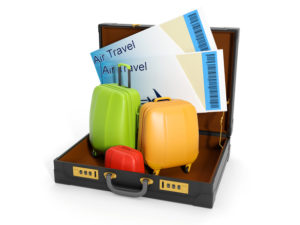 Traveling is one of the industries which are always thriving, even during the economic crisis. People travel for leisure or business all the time; companies delegate expert employees to new business locations, professional organizations organize conferences with an international attendance. Thus, on every given day, millions of people are travelling by plane and checking into hotels.
Traveling is one of the industries which are always thriving, even during the economic crisis. People travel for leisure or business all the time; companies delegate expert employees to new business locations, professional organizations organize conferences with an international attendance. Thus, on every given day, millions of people are travelling by plane and checking into hotels.
This means that as a home-based travel agency owner you have a very good chance to be successful and run a business which is not likely to fail. Even with so many mobile apps and websites for booking flights and hotel rooms, there are still a lot of people who do not have the time to make travel arrangements on their own, or trust the professional recommendations made by a travel agent.
So, what are the basic steps for opening your own home-based travel agency? The basic prerequisites are the same for all kinds of home-based business. You have to decide on the legal form of incorporating your business, register for tax purposes, arrange your home office, and take extra business insurance for property and third party liability.
In this article we will focus on the specifics of setting up a travel business. This is what you will need to do:
1. Learn about the Business
Every business has its specifics – its terms and systems – and you need to know about them. In some cases, if you want to sign up with a host agency to act as their representative, they will give you a test to assess your knowledge in this specific industry. There are terms and conditions applying to hotel room booking and plane tickets, there are many travel and visa requirements for overseas travel, and you must know all of these terms and inform your clients of them,
Also, all kinds of bookings are done through dedicated online platforms. Joining a course for travel agents will give you the opportunity to learn how to use these platforms – something which is not possible if you are not enrolled in a special class.
2. Find Your Niche
There are many niches in the travel business, and for a small home-based business it is a good idea to focus on one, at least at the beginning. Once you master it and become more confident in your skills, you can expand to new market segments.
Business travel is a very active niche with plenty opportunities of doing business all year round. On the other hand, honeymoon or adventure travel will gain you higher commissions and the opportunity to discover exciting new places where you may take your own family for a vacation.
3. Decide How You Want to Work
As a home-based travel agency owner, you can work as a referral agent, sign up with a host agency or do business as an independent travel agent.
As a referral agent, you will seek clients and refer them to the agency you collaborate with. For every travel package or booking made by a client referred by you, you will receive a commission.
If you choose to work for a host agency, then you will do the booking yourself using the online platforms and systems of the company. This form of operating as a home-based travel agent has the advantage that you will represent a reputable company, with a solid marketing and customer care strategy. On the other hand, some agencies request an entrance fee and monthly royalty fees.
If you decide to operate as an independent agency, you will have to do all the work, building your brand name and reputation, negotiating fees with hotels and airlines, and finding your customers on your own. It is very hard work, but the overall margin will be higher compared to the commission-based operation.
4. Join Professional Associations
Being a member of professional travel agents associations, such as the American Society of Travel Agents, the National Association of Commissioned Travel Agents or the International Air Transport Association will instantly earn you extra trust and confidence when dealing with potential customers. It will also offer you access to various educational materials, conferences, the opportunity to meet people in this industry and build a network of potential collaborators, suppliers or business partners.
